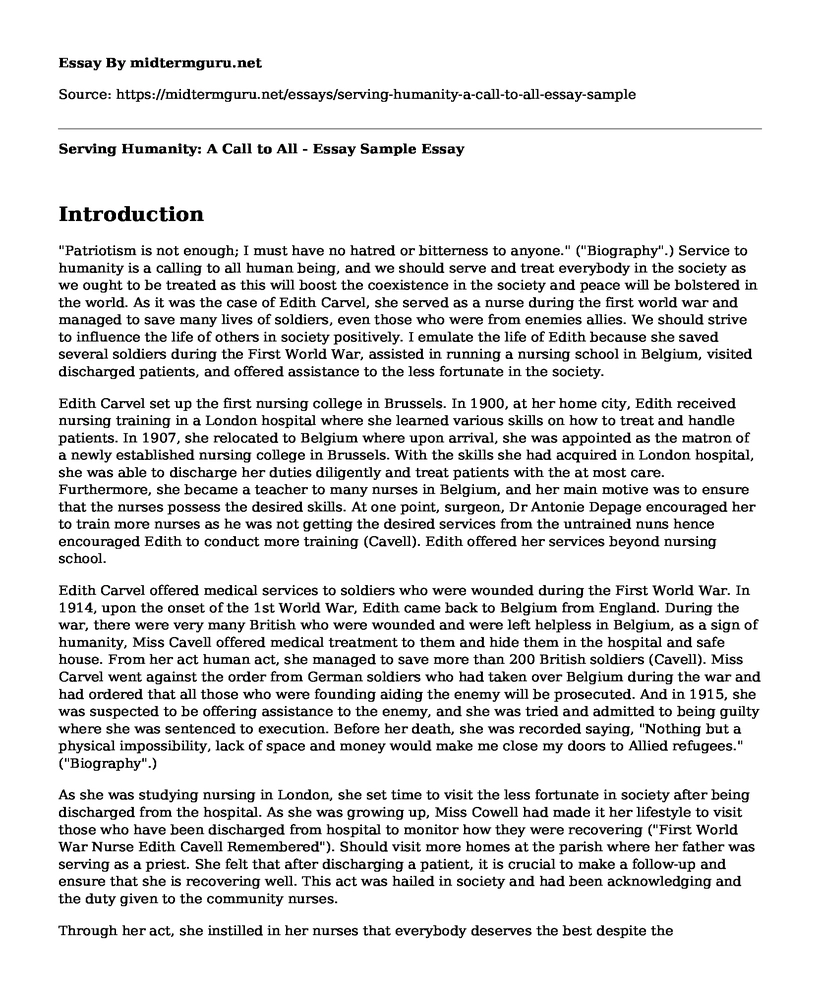Introduction
"Patriotism is not enough; I must have no hatred or bitterness to anyone." ("Biography".) Service to humanity is a calling to all human being, and we should serve and treat everybody in the society as we ought to be treated as this will boost the coexistence in the society and peace will be bolstered in the world. As it was the case of Edith Carvel, she served as a nurse during the first world war and managed to save many lives of soldiers, even those who were from enemies allies. We should strive to influence the life of others in society positively. I emulate the life of Edith because she saved several soldiers during the First World War, assisted in running a nursing school in Belgium, visited discharged patients, and offered assistance to the less fortunate in the society.
Edith Carvel set up the first nursing college in Brussels. In 1900, at her home city, Edith received nursing training in a London hospital where she learned various skills on how to treat and handle patients. In 1907, she relocated to Belgium where upon arrival, she was appointed as the matron of a newly established nursing college in Brussels. With the skills she had acquired in London hospital, she was able to discharge her duties diligently and treat patients with the at most care. Furthermore, she became a teacher to many nurses in Belgium, and her main motive was to ensure that the nurses possess the desired skills. At one point, surgeon, Dr Antonie Depage encouraged her to train more nurses as he was not getting the desired services from the untrained nuns hence encouraged Edith to conduct more training (Cavell). Edith offered her services beyond nursing school.
Edith Carvel offered medical services to soldiers who were wounded during the First World War. In 1914, upon the onset of the 1st World War, Edith came back to Belgium from England. During the war, there were very many British who were wounded and were left helpless in Belgium, as a sign of humanity, Miss Cavell offered medical treatment to them and hide them in the hospital and safe house. From her act human act, she managed to save more than 200 British soldiers (Cavell). Miss Carvel went against the order from German soldiers who had taken over Belgium during the war and had ordered that all those who were founding aiding the enemy will be prosecuted. And in 1915, she was suspected to be offering assistance to the enemy, and she was tried and admitted to being guilty where she was sentenced to execution. Before her death, she was recorded saying, "Nothing but a physical impossibility, lack of space and money would make me close my doors to Allied refugees." ("Biography".)
As she was studying nursing in London, she set time to visit the less fortunate in society after being discharged from the hospital. As she was growing up, Miss Cowell had made it her lifestyle to visit those who have been discharged from hospital to monitor how they were recovering ("First World War Nurse Edith Cavell Remembered"). Should visit more homes at the parish where her father was serving as a priest. She felt that after discharging a patient, it is crucial to make a follow-up and ensure that she is recovering well. This act was hailed in society and had been acknowledging and the duty given to the community nurses.
Through her act, she instilled in her nurses that everybody deserves the best despite the background. Though her humanitarian acts, Miss Carvell displayed to her nursing students that it is always prudent to ensure that we offer our services in the society despite the existence of misunderstanding and that everyone deserves the best (Vincent). At night before her execution, she was recorded saying that "Patriotism is not enough; I must have no hatred or bitterness to anyone."
Conclusion
In conclusion, service to humanity is a noble calling which should be embraced in society. Despite the difficulty in the war zone, Miss Carvell was able to discharge her duties without biasness to all soldiers, even unto those from enemies allies. Throughout her life, Carvel grew up learning human values through her parents as they used to visit the less fortunate in society, and her life is full of humanity service and worth to be emulated.
Work Cited
"Biography". 2015, https://www.biographyonline.net/humanitarian/edith-cavell.html. Accessed 23 June 2019.
"First World War Nurse Edith Cavell Remembered". Vol 27, no. 7, 2012, pp. 5-5. RCN Publishing Ltd., doi:10.7748/ns2012.10.27.7.5.p9659.
Cavell, F.M.Scott. "Miss Edith Cavell and Homes of Rest for Nurses.". The Lancet, vol 188, no. 4859, 1916, p. 693. Elsevier BV, doi:10.1016/s0140-6736(01)27628-4.
Vincent, Emma. "Fatal Destiny: Edith Cavell, World War I Nurse (Second Edition) Arthur Terri Fatal Destiny: Edith Cavell, World War I Nurse (Second Edition)504Pp PS12 Henschel Haus Publishing 978-1595983541 1595983546". Nursing Standard, vol 29, no. 35, 2015, pp. 26-26. RCN Publishing Ltd., doi:10.7748/ns.29.35.26.s32.
Cite this page
Serving Humanity: A Call to All - Essay Sample. (2023, Jan 25). Retrieved from https://midtermguru.com/essays/serving-humanity-a-call-to-all-essay-sample
If you are the original author of this essay and no longer wish to have it published on the midtermguru.com website, please click below to request its removal:
- Essay on Infant Simulator Programs and Their Failure to Reduce Teenage Pregnancies
- Critical Essay on The Gender Trap: Parents and the Pitfalls of Raising Boys and Girls
- Questions and Answers on Communication With Customers - Paper Example
- Racial Segregation: Research Proposal
- Research Paper on Oncology Patients in the ED
- Essay Sample on Social Impact on Quality of Life
- Racial Discrimination: From Colonial Period to Today - Essay Sample







